For a while now I wanted to have direct access to the
Signal database of messages and
channels of my Desktop edition of Signal. I prefer the enforced end
to end encryption of Signal these days for my communication with
friends and family, to increase the level of safety and privacy as
well as raising the cost of the mass surveillance government and
non-government entities practice these days. In August I came across
a nice
recipe
on how to use sqlcipher to extract statistics from the Signal
database explaining how to do this. Unfortunately this did not
work with the version of sqlcipher in Debian. The
sqlcipher
package is a "fork" of the sqlite package with added support for
encrypted databases. Sadly the current Debian maintainer
announced more than three
years ago that he did not have time to maintain sqlcipher, so it
seemed unlikely to be upgraded by the maintainer. I was reluctant to
take on the job myself, as I have very limited experience maintaining
shared libraries in Debian. After waiting and hoping for a few
months, I gave up the last week, and set out to update the package. In
the process I orphaned it to make it more obvious for the next person
looking at it that the package need proper maintenance.
The version in Debian was around five years old, and quite a lot of
changes had taken place upstream into the Debian maintenance git
repository. After spending a few days importing the new upstream
versions, realising that upstream did not care much for SONAME
versioning as I saw library symbols being both added and removed with
minor version number changes to the project, I concluded that I had to
do a SONAME bump of the library package to avoid surprising the
reverse dependencies. I even added a simple
autopkgtest script to ensure the package work as intended. Dug deep
into the hole of learning shared library maintenance, I set out a few
days ago to upload the new version to Debian experimental to see what
the quality assurance framework in Debian had to say about the result.
The feedback told me the pacakge was not too shabby, and yesterday I
uploaded the latest version to Debian unstable. It should enter
testing today or tomorrow, perhaps delayed by
a small library
transition.
Armed with a new version of sqlcipher, I can now have a look at the
SQL database in ~/.config/Signal/sql/db.sqlite. First, one need to
fetch the encryption key from the Signal configuration using this
simple JSON extraction command:
/usr/bin/jq -r '."key"' ~/.config/Signal/config.json
Assuming the result from that command is 'secretkey', which is a
hexadecimal number representing the key used to encrypt the database.
Next, one can now connect to the database and inject the encryption
key for access via SQL to fetch information from the database. Here
is an example dumping the database structure:
% sqlcipher ~/.config/Signal/sql/db.sqlite
sqlite> PRAGMA key = "x'secretkey'";
sqlite> .schema
CREATE TABLE sqlite_stat1(tbl,idx,stat);
CREATE TABLE conversations(
id STRING PRIMARY KEY ASC,
json TEXT,
active_at INTEGER,
type STRING,
members TEXT,
name TEXT,
profileName TEXT
, profileFamilyName TEXT, profileFullName TEXT, e164 TEXT, serviceId TEXT, groupId TEXT, profileLastFetchedAt INTEGER);
CREATE TABLE identityKeys(
id STRING PRIMARY KEY ASC,
json TEXT
);
CREATE TABLE items(
id STRING PRIMARY KEY ASC,
json TEXT
);
CREATE TABLE sessions(
id TEXT PRIMARY KEY,
conversationId TEXT,
json TEXT
, ourServiceId STRING, serviceId STRING);
CREATE TABLE attachment_downloads(
id STRING primary key,
timestamp INTEGER,
pending INTEGER,
json TEXT
);
CREATE TABLE sticker_packs(
id TEXT PRIMARY KEY,
key TEXT NOT NULL,
author STRING,
coverStickerId INTEGER,
createdAt INTEGER,
downloadAttempts INTEGER,
installedAt INTEGER,
lastUsed INTEGER,
status STRING,
stickerCount INTEGER,
title STRING
, attemptedStatus STRING, position INTEGER DEFAULT 0 NOT NULL, storageID STRING, storageVersion INTEGER, storageUnknownFields BLOB, storageNeedsSync
INTEGER DEFAULT 0 NOT NULL);
CREATE TABLE stickers(
id INTEGER NOT NULL,
packId TEXT NOT NULL,
emoji STRING,
height INTEGER,
isCoverOnly INTEGER,
lastUsed INTEGER,
path STRING,
width INTEGER,
PRIMARY KEY (id, packId),
CONSTRAINT stickers_fk
FOREIGN KEY (packId)
REFERENCES sticker_packs(id)
ON DELETE CASCADE
);
CREATE TABLE sticker_references(
messageId STRING,
packId TEXT,
CONSTRAINT sticker_references_fk
FOREIGN KEY(packId)
REFERENCES sticker_packs(id)
ON DELETE CASCADE
);
CREATE TABLE emojis(
shortName TEXT PRIMARY KEY,
lastUsage INTEGER
);
CREATE TABLE messages(
rowid INTEGER PRIMARY KEY ASC,
id STRING UNIQUE,
json TEXT,
readStatus INTEGER,
expires_at INTEGER,
sent_at INTEGER,
schemaVersion INTEGER,
conversationId STRING,
received_at INTEGER,
source STRING,
hasAttachments INTEGER,
hasFileAttachments INTEGER,
hasVisualMediaAttachments INTEGER,
expireTimer INTEGER,
expirationStartTimestamp INTEGER,
type STRING,
body TEXT,
messageTimer INTEGER,
messageTimerStart INTEGER,
messageTimerExpiresAt INTEGER,
isErased INTEGER,
isViewOnce INTEGER,
sourceServiceId TEXT, serverGuid STRING NULL, sourceDevice INTEGER, storyId STRING, isStory INTEGER
GENERATED ALWAYS AS (type IS 'story'), isChangeCreatedByUs INTEGER NOT NULL DEFAULT 0, isTimerChangeFromSync INTEGER
GENERATED ALWAYS AS (
json_extract(json, '$.expirationTimerUpdate.fromSync') IS 1
), seenStatus NUMBER default 0, storyDistributionListId STRING, expiresAt INT
GENERATED ALWAYS
AS (ifnull(
expirationStartTimestamp + (expireTimer * 1000),
9007199254740991
)), shouldAffectActivity INTEGER
GENERATED ALWAYS AS (
type IS NULL
OR
type NOT IN (
'change-number-notification',
'contact-removed-notification',
'conversation-merge',
'group-v1-migration',
'keychange',
'message-history-unsynced',
'profile-change',
'story',
'universal-timer-notification',
'verified-change'
)
), shouldAffectPreview INTEGER
GENERATED ALWAYS AS (
type IS NULL
OR
type NOT IN (
'change-number-notification',
'contact-removed-notification',
'conversation-merge',
'group-v1-migration',
'keychange',
'message-history-unsynced',
'profile-change',
'story',
'universal-timer-notification',
'verified-change'
)
), isUserInitiatedMessage INTEGER
GENERATED ALWAYS AS (
type IS NULL
OR
type NOT IN (
'change-number-notification',
'contact-removed-notification',
'conversation-merge',
'group-v1-migration',
'group-v2-change',
'keychange',
'message-history-unsynced',
'profile-change',
'story',
'universal-timer-notification',
'verified-change'
)
), mentionsMe INTEGER NOT NULL DEFAULT 0, isGroupLeaveEvent INTEGER
GENERATED ALWAYS AS (
type IS 'group-v2-change' AND
json_array_length(json_extract(json, '$.groupV2Change.details')) IS 1 AND
json_extract(json, '$.groupV2Change.details[0].type') IS 'member-remove' AND
json_extract(json, '$.groupV2Change.from') IS NOT NULL AND
json_extract(json, '$.groupV2Change.from') IS json_extract(json, '$.groupV2Change.details[0].aci')
), isGroupLeaveEventFromOther INTEGER
GENERATED ALWAYS AS (
isGroupLeaveEvent IS 1
AND
isChangeCreatedByUs IS 0
), callId TEXT
GENERATED ALWAYS AS (
json_extract(json, '$.callId')
));
CREATE TABLE sqlite_stat4(tbl,idx,neq,nlt,ndlt,sample);
CREATE TABLE jobs(
id TEXT PRIMARY KEY,
queueType TEXT STRING NOT NULL,
timestamp INTEGER NOT NULL,
data STRING TEXT
);
CREATE TABLE reactions(
conversationId STRING,
emoji STRING,
fromId STRING,
messageReceivedAt INTEGER,
targetAuthorAci STRING,
targetTimestamp INTEGER,
unread INTEGER
, messageId STRING);
CREATE TABLE senderKeys(
id TEXT PRIMARY KEY NOT NULL,
senderId TEXT NOT NULL,
distributionId TEXT NOT NULL,
data BLOB NOT NULL,
lastUpdatedDate NUMBER NOT NULL
);
CREATE TABLE unprocessed(
id STRING PRIMARY KEY ASC,
timestamp INTEGER,
version INTEGER,
attempts INTEGER,
envelope TEXT,
decrypted TEXT,
source TEXT,
serverTimestamp INTEGER,
sourceServiceId STRING
, serverGuid STRING NULL, sourceDevice INTEGER, receivedAtCounter INTEGER, urgent INTEGER, story INTEGER);
CREATE TABLE sendLogPayloads(
id INTEGER PRIMARY KEY ASC,
timestamp INTEGER NOT NULL,
contentHint INTEGER NOT NULL,
proto BLOB NOT NULL
, urgent INTEGER, hasPniSignatureMessage INTEGER DEFAULT 0 NOT NULL);
CREATE TABLE sendLogRecipients(
payloadId INTEGER NOT NULL,
recipientServiceId STRING NOT NULL,
deviceId INTEGER NOT NULL,
PRIMARY KEY (payloadId, recipientServiceId, deviceId),
CONSTRAINT sendLogRecipientsForeignKey
FOREIGN KEY (payloadId)
REFERENCES sendLogPayloads(id)
ON DELETE CASCADE
);
CREATE TABLE sendLogMessageIds(
payloadId INTEGER NOT NULL,
messageId STRING NOT NULL,
PRIMARY KEY (payloadId, messageId),
CONSTRAINT sendLogMessageIdsForeignKey
FOREIGN KEY (payloadId)
REFERENCES sendLogPayloads(id)
ON DELETE CASCADE
);
CREATE TABLE preKeys(
id STRING PRIMARY KEY ASC,
json TEXT
, ourServiceId NUMBER
GENERATED ALWAYS AS (json_extract(json, '$.ourServiceId')));
CREATE TABLE signedPreKeys(
id STRING PRIMARY KEY ASC,
json TEXT
, ourServiceId NUMBER
GENERATED ALWAYS AS (json_extract(json, '$.ourServiceId')));
CREATE TABLE badges(
id TEXT PRIMARY KEY,
category TEXT NOT NULL,
name TEXT NOT NULL,
descriptionTemplate TEXT NOT NULL
);
CREATE TABLE badgeImageFiles(
badgeId TEXT REFERENCES badges(id)
ON DELETE CASCADE
ON UPDATE CASCADE,
'order' INTEGER NOT NULL,
url TEXT NOT NULL,
localPath TEXT,
theme TEXT NOT NULL
);
CREATE TABLE storyReads (
authorId STRING NOT NULL,
conversationId STRING NOT NULL,
storyId STRING NOT NULL,
storyReadDate NUMBER NOT NULL,
PRIMARY KEY (authorId, storyId)
);
CREATE TABLE storyDistributions(
id STRING PRIMARY KEY NOT NULL,
name TEXT,
senderKeyInfoJson STRING
, deletedAtTimestamp INTEGER, allowsReplies INTEGER, isBlockList INTEGER, storageID STRING, storageVersion INTEGER, storageUnknownFields BLOB, storageNeedsSync INTEGER);
CREATE TABLE storyDistributionMembers(
listId STRING NOT NULL REFERENCES storyDistributions(id)
ON DELETE CASCADE
ON UPDATE CASCADE,
serviceId STRING NOT NULL,
PRIMARY KEY (listId, serviceId)
);
CREATE TABLE uninstalled_sticker_packs (
id STRING NOT NULL PRIMARY KEY,
uninstalledAt NUMBER NOT NULL,
storageID STRING,
storageVersion NUMBER,
storageUnknownFields BLOB,
storageNeedsSync INTEGER NOT NULL
);
CREATE TABLE groupCallRingCancellations(
ringId INTEGER PRIMARY KEY,
createdAt INTEGER NOT NULL
);
CREATE TABLE IF NOT EXISTS 'messages_fts_data'(id INTEGER PRIMARY KEY, block BLOB);
CREATE TABLE IF NOT EXISTS 'messages_fts_idx'(segid, term, pgno, PRIMARY KEY(segid, term)) WITHOUT ROWID;
CREATE TABLE IF NOT EXISTS 'messages_fts_content'(id INTEGER PRIMARY KEY, c0);
CREATE TABLE IF NOT EXISTS 'messages_fts_docsize'(id INTEGER PRIMARY KEY, sz BLOB);
CREATE TABLE IF NOT EXISTS 'messages_fts_config'(k PRIMARY KEY, v) WITHOUT ROWID;
CREATE TABLE edited_messages(
messageId STRING REFERENCES messages(id)
ON DELETE CASCADE,
sentAt INTEGER,
readStatus INTEGER
, conversationId STRING);
CREATE TABLE mentions (
messageId REFERENCES messages(id) ON DELETE CASCADE,
mentionAci STRING,
start INTEGER,
length INTEGER
);
CREATE TABLE kyberPreKeys(
id STRING PRIMARY KEY NOT NULL,
json TEXT NOT NULL, ourServiceId NUMBER
GENERATED ALWAYS AS (json_extract(json, '$.ourServiceId')));
CREATE TABLE callsHistory (
callId TEXT PRIMARY KEY,
peerId TEXT NOT NULL, -- conversation id (legacy) uuid groupId roomId
ringerId TEXT DEFAULT NULL, -- ringer uuid
mode TEXT NOT NULL, -- enum "Direct" "Group"
type TEXT NOT NULL, -- enum "Audio" "Video" "Group"
direction TEXT NOT NULL, -- enum "Incoming" "Outgoing
-- Direct: enum "Pending" "Missed" "Accepted" "Deleted"
-- Group: enum "GenericGroupCall" "OutgoingRing" "Ringing" "Joined" "Missed" "Declined" "Accepted" "Deleted"
status TEXT NOT NULL,
timestamp INTEGER NOT NULL,
UNIQUE (callId, peerId) ON CONFLICT FAIL
);
[ dropped all indexes to save space in this blog post ]
CREATE TRIGGER messages_on_view_once_update AFTER UPDATE ON messages
WHEN
new.body IS NOT NULL AND new.isViewOnce = 1
BEGIN
DELETE FROM messages_fts WHERE rowid = old.rowid;
END;
CREATE TRIGGER messages_on_insert AFTER INSERT ON messages
WHEN new.isViewOnce IS NOT 1 AND new.storyId IS NULL
BEGIN
INSERT INTO messages_fts
(rowid, body)
VALUES
(new.rowid, new.body);
END;
CREATE TRIGGER messages_on_delete AFTER DELETE ON messages BEGIN
DELETE FROM messages_fts WHERE rowid = old.rowid;
DELETE FROM sendLogPayloads WHERE id IN (
SELECT payloadId FROM sendLogMessageIds
WHERE messageId = old.id
);
DELETE FROM reactions WHERE rowid IN (
SELECT rowid FROM reactions
WHERE messageId = old.id
);
DELETE FROM storyReads WHERE storyId = old.storyId;
END;
CREATE VIRTUAL TABLE messages_fts USING fts5(
body,
tokenize = 'signal_tokenizer'
);
CREATE TRIGGER messages_on_update AFTER UPDATE ON messages
WHEN
(new.body IS NULL OR old.body IS NOT new.body) AND
new.isViewOnce IS NOT 1 AND new.storyId IS NULL
BEGIN
DELETE FROM messages_fts WHERE rowid = old.rowid;
INSERT INTO messages_fts
(rowid, body)
VALUES
(new.rowid, new.body);
END;
CREATE TRIGGER messages_on_insert_insert_mentions AFTER INSERT ON messages
BEGIN
INSERT INTO mentions (messageId, mentionAci, start, length)
SELECT messages.id, bodyRanges.value ->> 'mentionAci' as mentionAci,
bodyRanges.value ->> 'start' as start,
bodyRanges.value ->> 'length' as length
FROM messages, json_each(messages.json ->> 'bodyRanges') as bodyRanges
WHERE bodyRanges.value ->> 'mentionAci' IS NOT NULL
AND messages.id = new.id;
END;
CREATE TRIGGER messages_on_update_update_mentions AFTER UPDATE ON messages
BEGIN
DELETE FROM mentions WHERE messageId = new.id;
INSERT INTO mentions (messageId, mentionAci, start, length)
SELECT messages.id, bodyRanges.value ->> 'mentionAci' as mentionAci,
bodyRanges.value ->> 'start' as start,
bodyRanges.value ->> 'length' as length
FROM messages, json_each(messages.json ->> 'bodyRanges') as bodyRanges
WHERE bodyRanges.value ->> 'mentionAci' IS NOT NULL
AND messages.id = new.id;
END;
sqlite>
Finally I have the tool needed to inspect and process Signal
messages that I need, without using the vendor provided client. Now
on to transforming it to a more useful format.
As usual, if you use Bitcoin and want to show your support of my
activities, please send Bitcoin donations to my address
15oWEoG9dUPovwmUL9KWAnYRtNJEkP1u1b.
 De 27 a 30 de abril de 2024 foi realizada a
MiniDebConf Belo Horizonte 2024 no Campus
Pampulha da UFMG - Universidade Federal de Minas Gerais,
em Belo Horizonte - MG.
De 27 a 30 de abril de 2024 foi realizada a
MiniDebConf Belo Horizonte 2024 no Campus
Pampulha da UFMG - Universidade Federal de Minas Gerais,
em Belo Horizonte - MG.
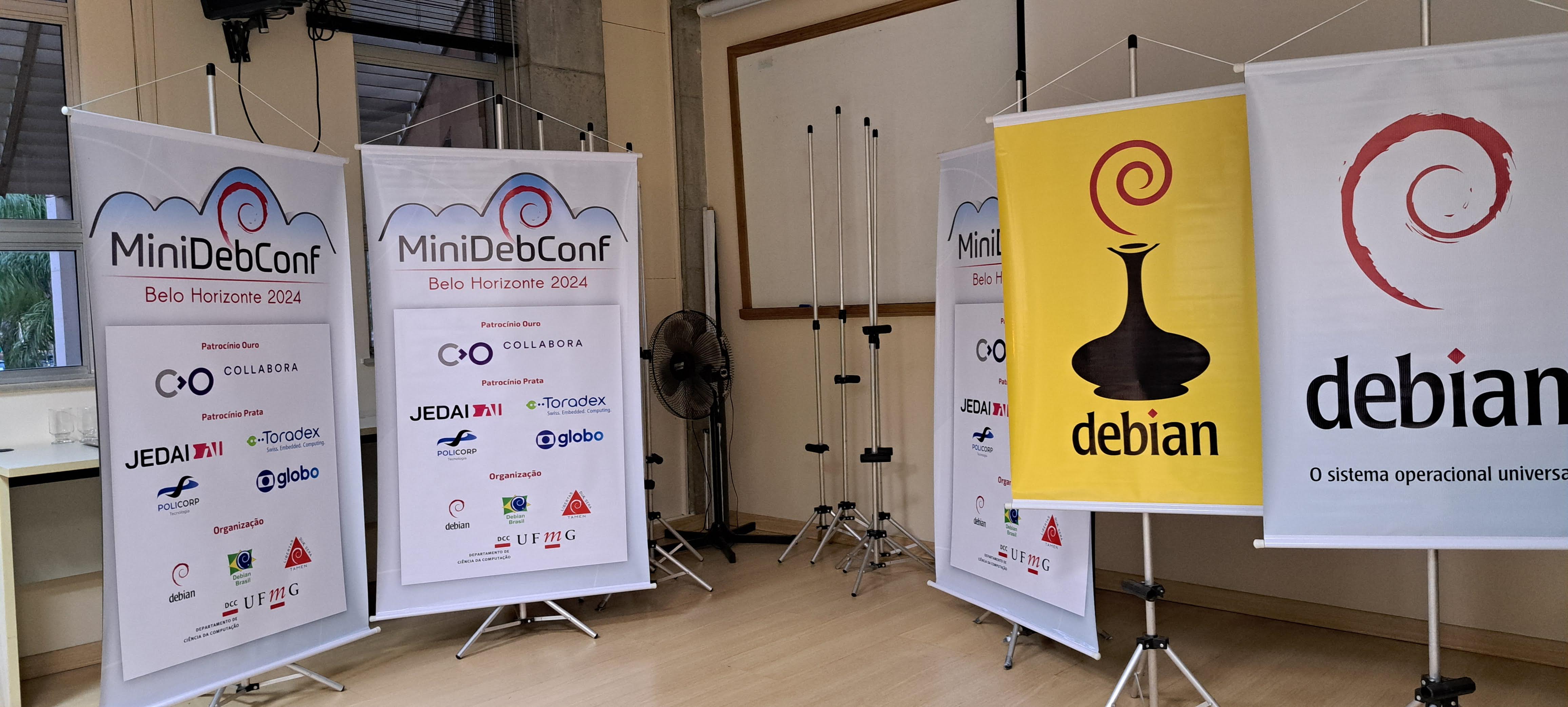 Esta foi a quinta vez que uma MiniDebConf (como um evento presencial exclusivo
sobre Debian) aconteceu no Brasil. As edi es anteriores foram em Curitiba
(2016,
2017, e
2018), e em
Bras lia 2023. Tivemos outras edi es
de MiniDebConfs realizadas dentro de eventos de Software Livre como o
FISL e a Latinoware, e
outros eventos online. Veja o nosso
hist rico de eventos.
Paralelamente MiniDebConf, no dia 27 (s bado) aconteceu o
FLISOL - Festival Latino-americano de Instala o de Software Livre,
maior evento da Am rica Latina de divulga o de Software Livre realizado desde o
ano de 2005 simultaneamente em v rias cidades.
A MiniDebConf Belo Horizonte 2024 foi um sucesso (assim como as edi es
anteriores) gra as participa o de todos(as), independentemente do n vel de
conhecimento sobre o Debian. Valorizamos a presen a tanto dos(as) usu rios(as)
iniciantes que est o se familiarizando com o sistema quanto dos(as)
desenvolvedores(as) oficiais do projeto. O esp rito de acolhimento e colabora o
esteve presente em todos os momentos.
Esta foi a quinta vez que uma MiniDebConf (como um evento presencial exclusivo
sobre Debian) aconteceu no Brasil. As edi es anteriores foram em Curitiba
(2016,
2017, e
2018), e em
Bras lia 2023. Tivemos outras edi es
de MiniDebConfs realizadas dentro de eventos de Software Livre como o
FISL e a Latinoware, e
outros eventos online. Veja o nosso
hist rico de eventos.
Paralelamente MiniDebConf, no dia 27 (s bado) aconteceu o
FLISOL - Festival Latino-americano de Instala o de Software Livre,
maior evento da Am rica Latina de divulga o de Software Livre realizado desde o
ano de 2005 simultaneamente em v rias cidades.
A MiniDebConf Belo Horizonte 2024 foi um sucesso (assim como as edi es
anteriores) gra as participa o de todos(as), independentemente do n vel de
conhecimento sobre o Debian. Valorizamos a presen a tanto dos(as) usu rios(as)
iniciantes que est o se familiarizando com o sistema quanto dos(as)
desenvolvedores(as) oficiais do projeto. O esp rito de acolhimento e colabora o
esteve presente em todos os momentos.
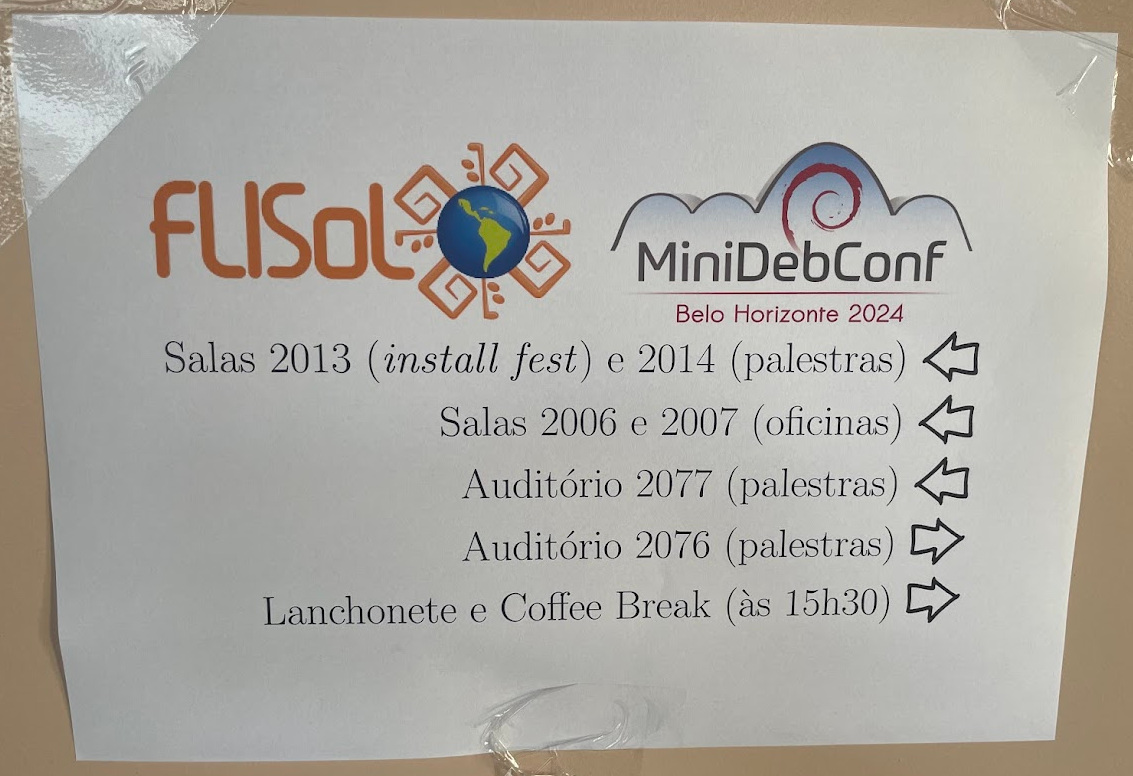 N meros da edi o 2024
Durante os quatro dias de evento aconteceram diversas atividades para todos os
n veis de usu rios(as) e colaboradores(as) do projeto Debian. A
programa o oficial foi
composta de:
N meros da edi o 2024
Durante os quatro dias de evento aconteceram diversas atividades para todos os
n veis de usu rios(as) e colaboradores(as) do projeto Debian. A
programa o oficial foi
composta de:
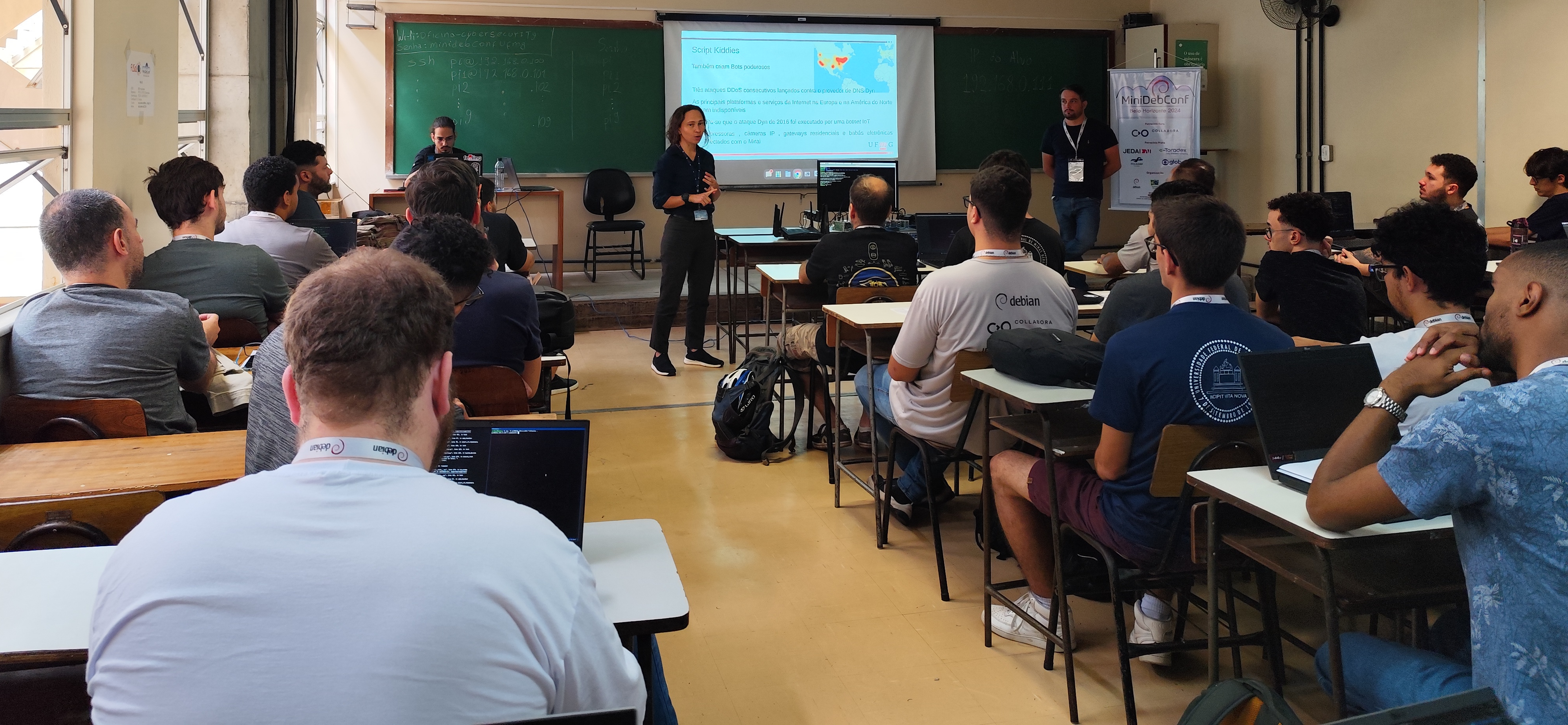 Os n meros finais da MiniDebConf Belo Horizonte 2024 mostram que tivemos um
recorde de participantes.
Os n meros finais da MiniDebConf Belo Horizonte 2024 mostram que tivemos um
recorde de participantes.
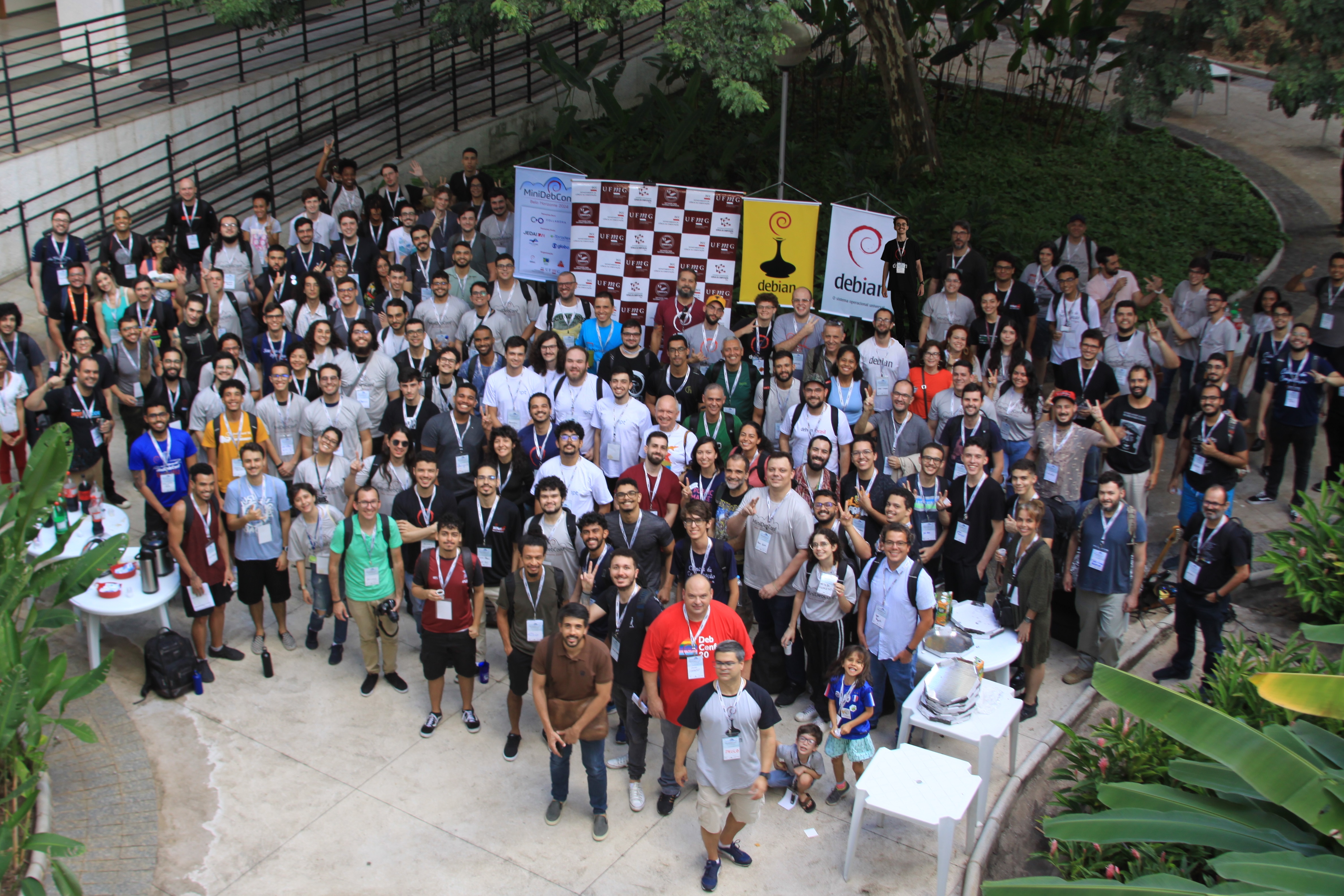
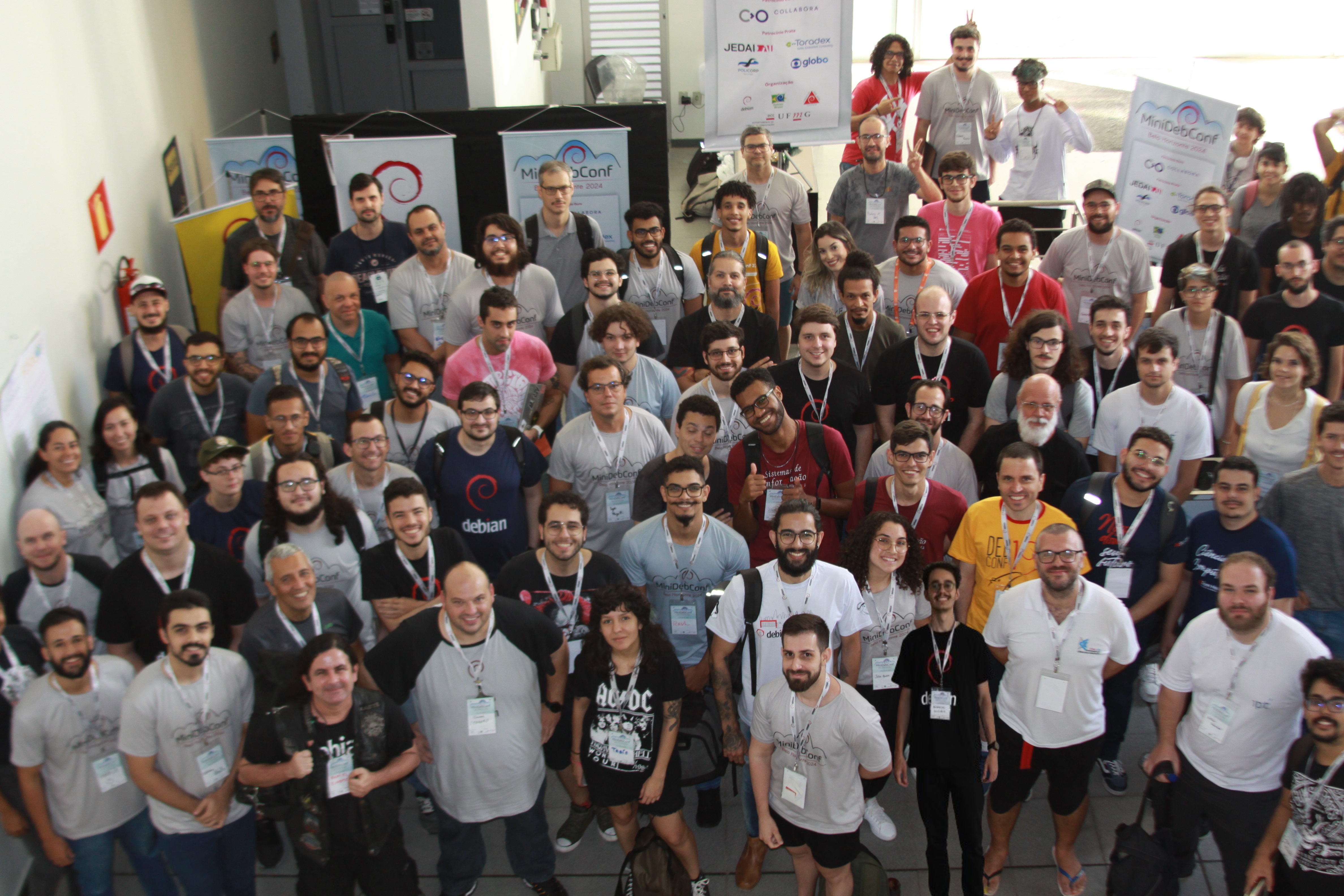 Atividades
A programa o da MiniDebConf foi intensa e diversificada. Nos dias 27, 29 e 30
(s bado, segunda e ter a-feira) tivemos palestras, debates, oficinas e muitas
atividades pr ticas.
Atividades
A programa o da MiniDebConf foi intensa e diversificada. Nos dias 27, 29 e 30
(s bado, segunda e ter a-feira) tivemos palestras, debates, oficinas e muitas
atividades pr ticas.
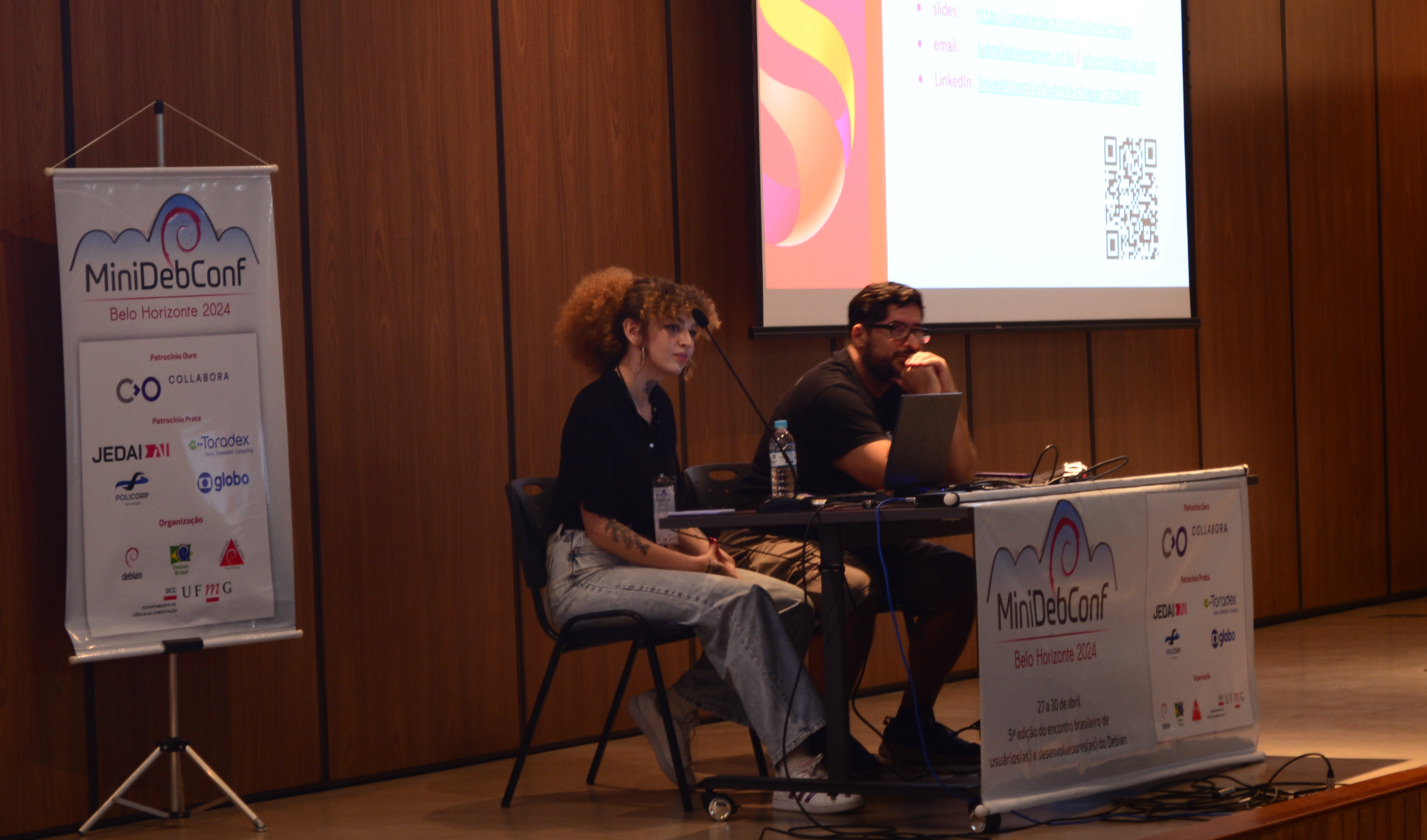 J no dia 28 (domingo), ocorreu o Day Trip, um dia dedicado a passeios pela
cidade. Pela manh sa mos do hotel e fomos, em um nibus fretado, para o
Mercado Central de Belo Horizonte. O pessoal
aproveitou para comprar v rias coisas como queijos, doces, cacha as e
lembrancinhas, al m de experimentar algumas comidas locais.
J no dia 28 (domingo), ocorreu o Day Trip, um dia dedicado a passeios pela
cidade. Pela manh sa mos do hotel e fomos, em um nibus fretado, para o
Mercado Central de Belo Horizonte. O pessoal
aproveitou para comprar v rias coisas como queijos, doces, cacha as e
lembrancinhas, al m de experimentar algumas comidas locais.
 Depois de 2 horas de passeio pelo Mercado, voltamos para o nibus e pegamos a
estrada para almo armos em um restaurante de comida t pica mineira.
Depois de 2 horas de passeio pelo Mercado, voltamos para o nibus e pegamos a
estrada para almo armos em um restaurante de comida t pica mineira.
 Com todos bem alimentados, voltamos para Belo Horizonte para visitarmos o
principal ponto tur stico da cidade: a Lagoa da Pampulha e a Capela S o
Francisco de Assis, mais conhecida como
Igrejinha da Pampulha.
Com todos bem alimentados, voltamos para Belo Horizonte para visitarmos o
principal ponto tur stico da cidade: a Lagoa da Pampulha e a Capela S o
Francisco de Assis, mais conhecida como
Igrejinha da Pampulha.
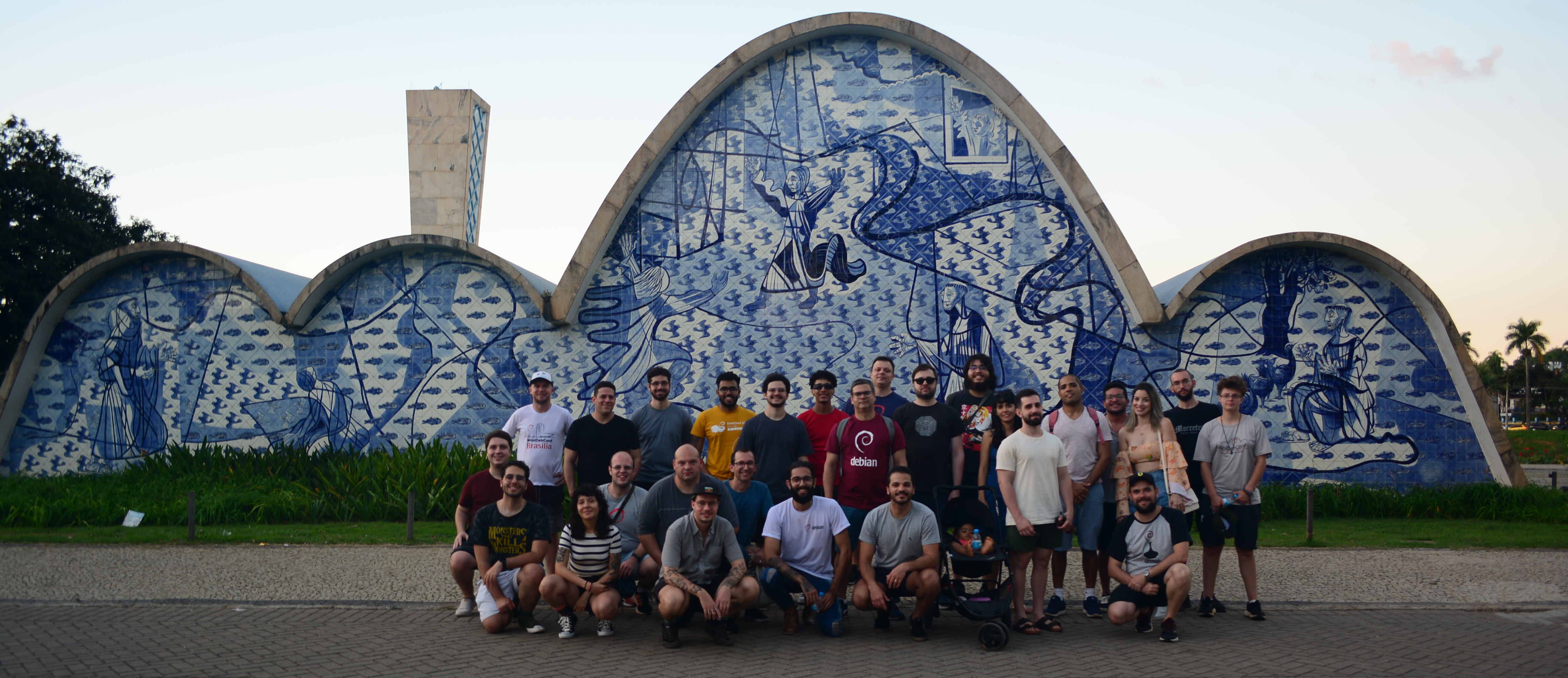 Voltamos para o hotel e o dia terminou no hacker space que montamos na sala
de eventos para o pessoal conversar, empacotar, e comer umas pizzas.
Voltamos para o hotel e o dia terminou no hacker space que montamos na sala
de eventos para o pessoal conversar, empacotar, e comer umas pizzas.
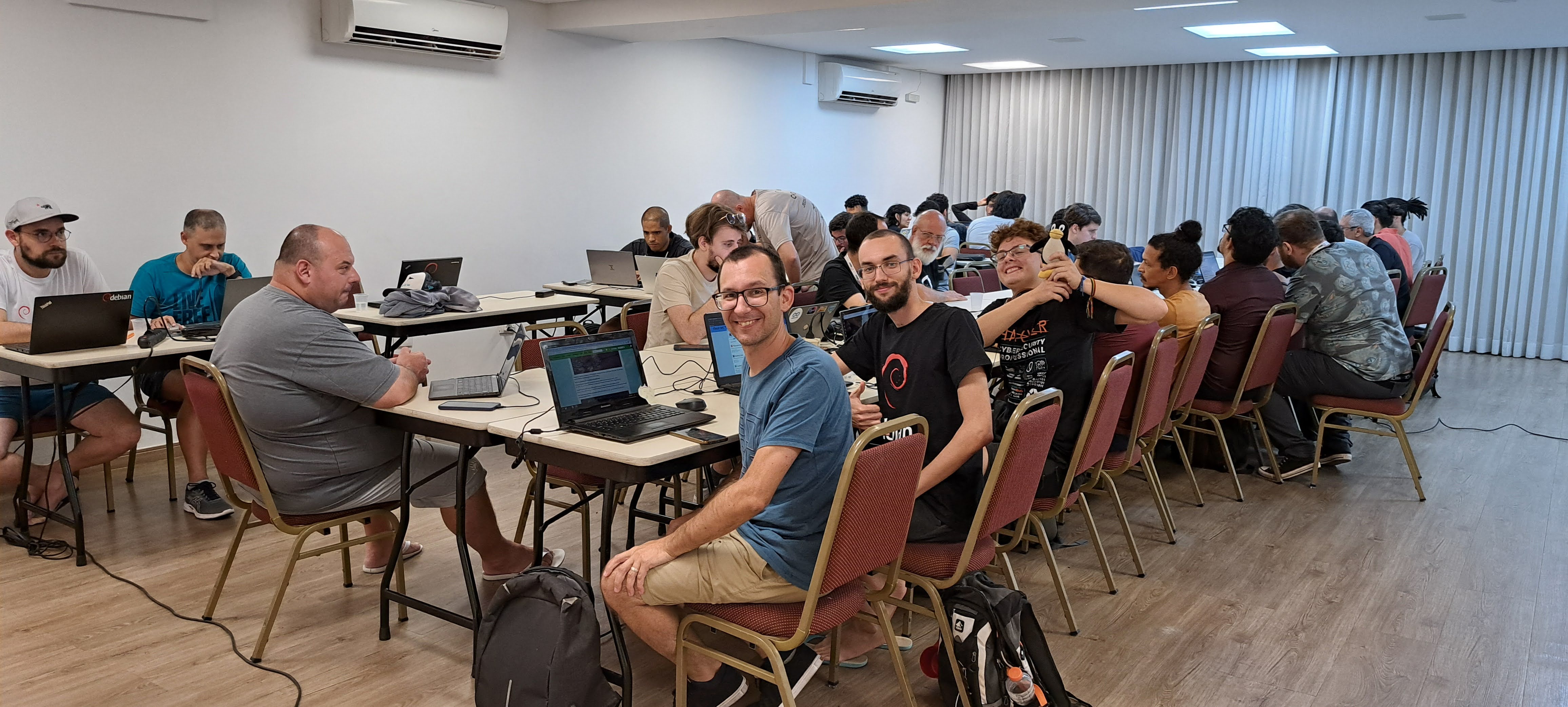 Financiamento coletivo
Pela terceira vez fizemos uma campanha de financiamento coletivo e foi incr vel
como as pessoas contribu ram! A meta inicial era arrecadar o valor equivalente
a uma cota ouro de R$ 3.000,00. Ao atingirmos essa meta, definimos uma nova,
equivalente a uma cota ouro + uma cota prata (R$ 5.000,00). E novamente
atingimos essa meta. Ent o propusermos como meta final o valor de uma cota
ouro + prata + bronze, que seria equivalente a R$ 6.000,00. O resultado foi que
arrecadamos R$ 6.706,79 com a ajuda de mais de 100 pessoas!
Muito obrigado as pessoas que contribu ram com qualquer valor. Como forma de
agradecimento,
listamos os nomes das pessoas que doaram.
Financiamento coletivo
Pela terceira vez fizemos uma campanha de financiamento coletivo e foi incr vel
como as pessoas contribu ram! A meta inicial era arrecadar o valor equivalente
a uma cota ouro de R$ 3.000,00. Ao atingirmos essa meta, definimos uma nova,
equivalente a uma cota ouro + uma cota prata (R$ 5.000,00). E novamente
atingimos essa meta. Ent o propusermos como meta final o valor de uma cota
ouro + prata + bronze, que seria equivalente a R$ 6.000,00. O resultado foi que
arrecadamos R$ 6.706,79 com a ajuda de mais de 100 pessoas!
Muito obrigado as pessoas que contribu ram com qualquer valor. Como forma de
agradecimento,
listamos os nomes das pessoas que doaram.
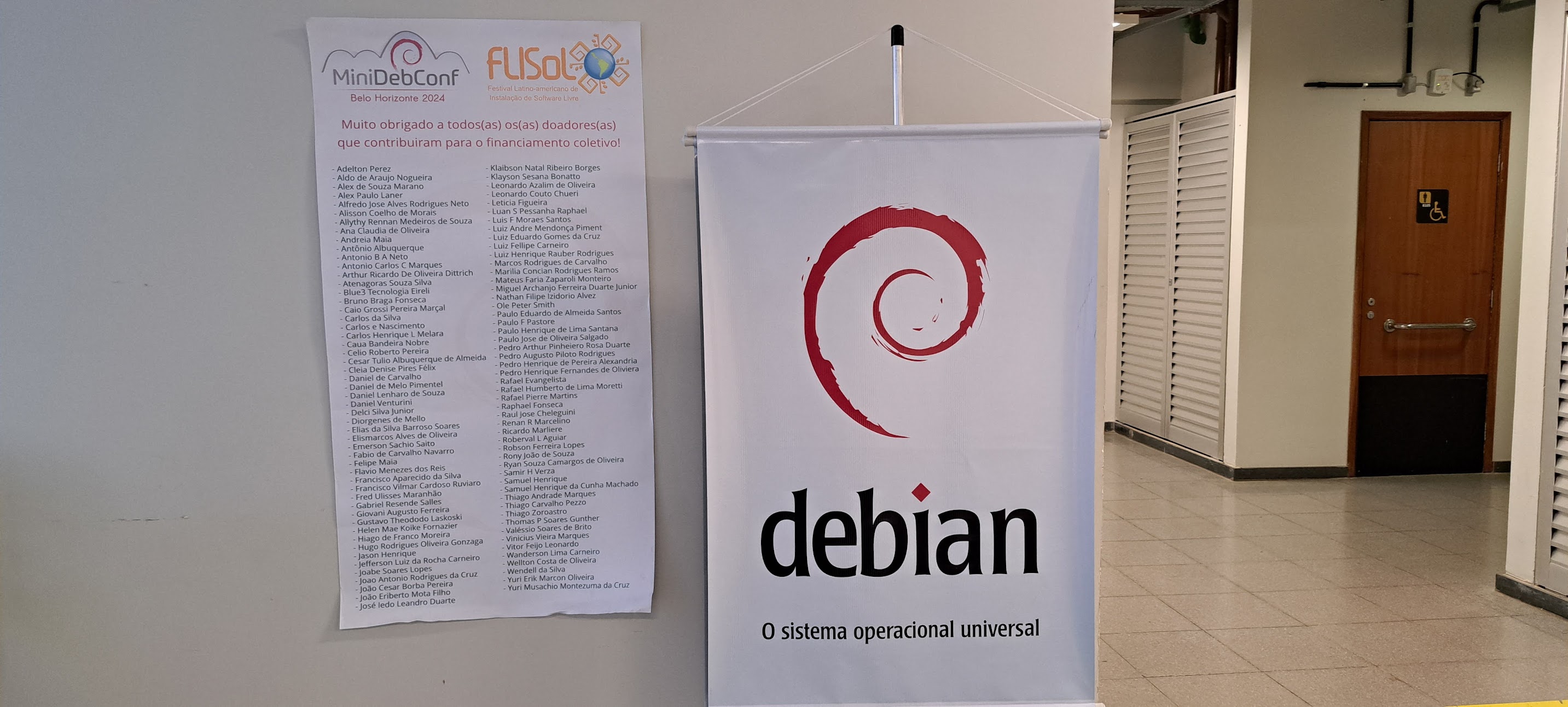 Bolsas de alimenta o, hospedagem e/ou passagens para participantes
Cada edi o da MiniDebConf trouxe alguma inova o, ou algum benef cio diferente
para os(a) participantes. Na edi o deste ano em Belo Horizonte, assim como
acontece nas DebConfs,
oferecemos bolsas de alimenta o, hospedagem e/ou passagens
para ajudar aquelas pessoas que gostariam de vir para o evento mas que
precisariam de algum tipo de ajuda.
No formul rio de inscri o, colocamos a op o para a pessoa solicitar bolsa de
alimenta o, hospedagem e/ou passagens, mas para isso, ela deveria se
identificar como contribuidor(a) (oficial ou n o oficial) do Debian e
escrever uma justificativa para o pedido.
N mero de pessoas beneficiadas:
Bolsas de alimenta o, hospedagem e/ou passagens para participantes
Cada edi o da MiniDebConf trouxe alguma inova o, ou algum benef cio diferente
para os(a) participantes. Na edi o deste ano em Belo Horizonte, assim como
acontece nas DebConfs,
oferecemos bolsas de alimenta o, hospedagem e/ou passagens
para ajudar aquelas pessoas que gostariam de vir para o evento mas que
precisariam de algum tipo de ajuda.
No formul rio de inscri o, colocamos a op o para a pessoa solicitar bolsa de
alimenta o, hospedagem e/ou passagens, mas para isso, ela deveria se
identificar como contribuidor(a) (oficial ou n o oficial) do Debian e
escrever uma justificativa para o pedido.
N mero de pessoas beneficiadas:
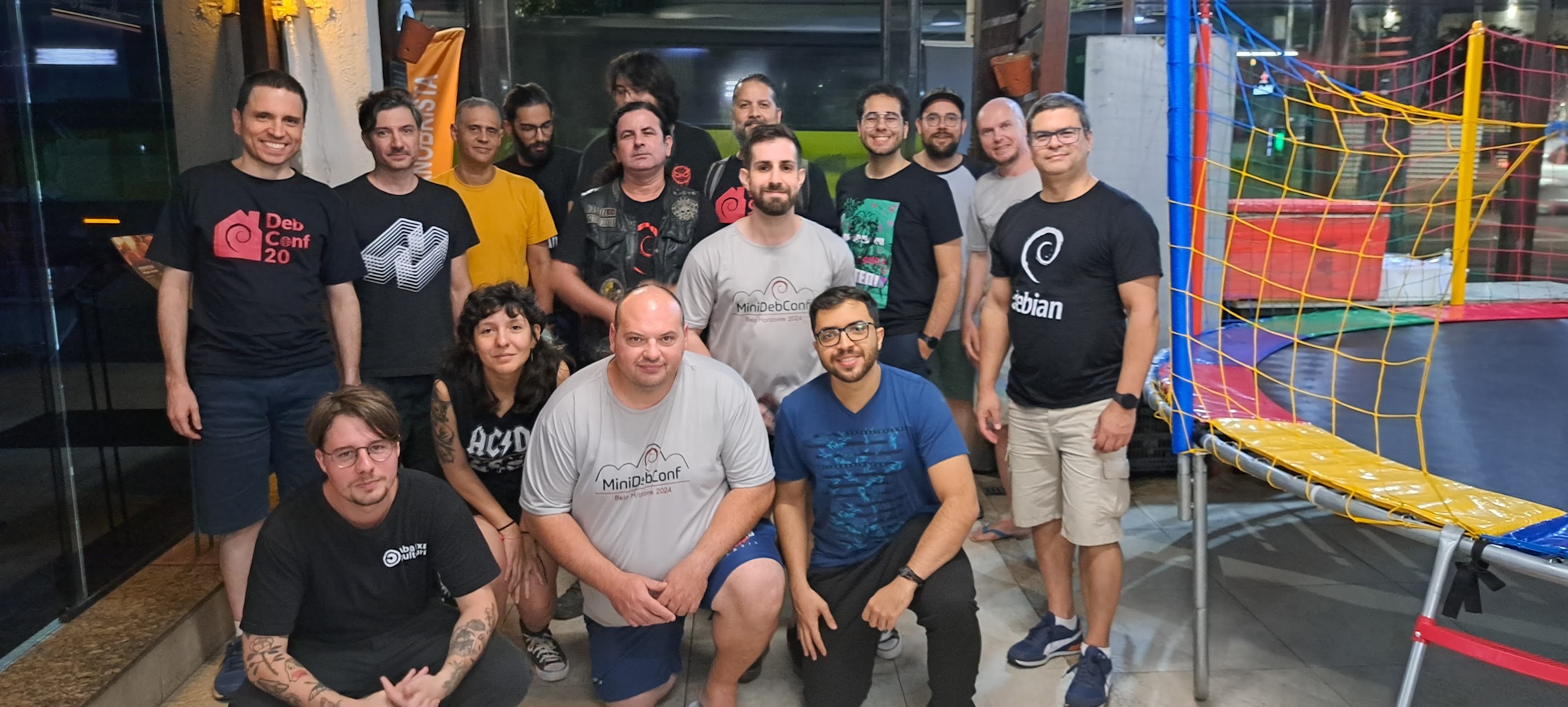 Fotos e v deos
Voc pode assistir as grava es das palestras nos links abaixo:
E ver as fotos feitas por v rios(as) colaboradores(as) nos links abaixo:
Agradecimentos
Gostar amos de agradecer a todos(as) os(as) participantes, organizadores(as),
volunt rios(as), patrocinadores(as) e apoiadores(as) que contribu ram para o
sucesso da MiniDebConf Belo Horizonte 2024.
Fotos e v deos
Voc pode assistir as grava es das palestras nos links abaixo:
E ver as fotos feitas por v rios(as) colaboradores(as) nos links abaixo:
Agradecimentos
Gostar amos de agradecer a todos(as) os(as) participantes, organizadores(as),
volunt rios(as), patrocinadores(as) e apoiadores(as) que contribu ram para o
sucesso da MiniDebConf Belo Horizonte 2024.
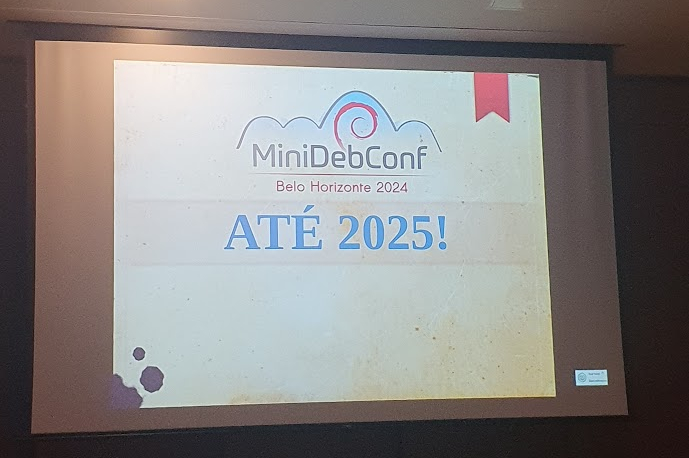 Patrocinadores
Ouro:
Prata:
Bronze:
Apoiadores
Organiza o
Patrocinadores
Ouro:
Prata:
Bronze:
Apoiadores
Organiza o
 Hi,
Keeping my promise for monthly bits, here's a quick snapshot of my first
ten days as DPL.
Special thanks to Jonathan for an insightful introduction that left less
room for questions. His introduction covered my first tasks like expense
approval and CTTE member appointments thoroughly. Although I made a
visible oversight by forgetting to exclude Simon McVittie from
the list, whose term has
Hi,
Keeping my promise for monthly bits, here's a quick snapshot of my first
ten days as DPL.
Special thanks to Jonathan for an insightful introduction that left less
room for questions. His introduction covered my first tasks like expense
approval and CTTE member appointments thoroughly. Although I made a
visible oversight by forgetting to exclude Simon McVittie from
the list, whose term has  We are very excited to announce that Debian has selected seven contributors to work
under mentorship on a variety of
We are very excited to announce that Debian has selected seven contributors to work
under mentorship on a variety of
 Those of you who haven t been in IT for far, far too long might not know that next month will be the 16th(!) anniversary of the
Those of you who haven t been in IT for far, far too long might not know that next month will be the 16th(!) anniversary of the 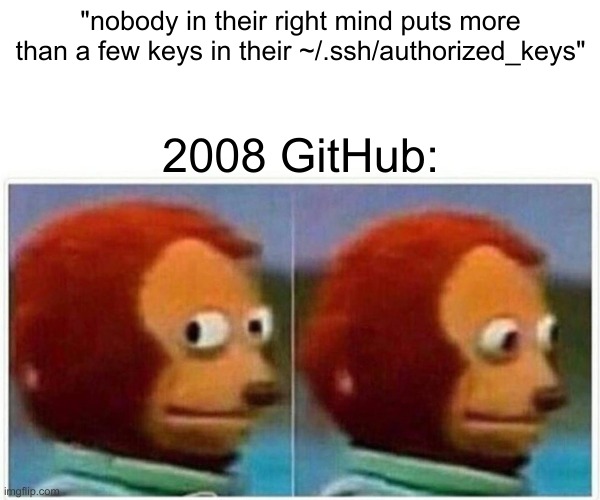
 They're called The Usual Suspects for a reason, but sometimes, it really is Keyser S ze
They're called The Usual Suspects for a reason, but sometimes, it really is Keyser S ze

 Last weekend was the bi-annual time to roll the main machine and
server to the current Ubuntu release, now at 23.04. It must now have
been fifteen or so years that I have used Ubuntu for my desktop / server
(for reasons I may write about another time). And of course it all
passed swimmingly as usual.
[ And a small aside, if I may. Among all these upgrades, one of my
favourite piece of tech trivia that may well be too little known remains
the dedication of the PostgreSQL maintainers installing the new version,
now PostgreSQL 15, seamlessly in parallel with the existing one, in my
case PostgreSQL 14, keeping both running (!!) on two neighbouring ports
(!!) so that there is no service disruption. So at some point, maybe
this weekend, I will run the provided script to dump-and-restore to
trigger the database migration at my convenience. Happy PostgreSQL on
Debian/Ubuntu user since the late 1990s. It. Just. Works. ]
[ Similarly, it is plainly amazeballs how
Last weekend was the bi-annual time to roll the main machine and
server to the current Ubuntu release, now at 23.04. It must now have
been fifteen or so years that I have used Ubuntu for my desktop / server
(for reasons I may write about another time). And of course it all
passed swimmingly as usual.
[ And a small aside, if I may. Among all these upgrades, one of my
favourite piece of tech trivia that may well be too little known remains
the dedication of the PostgreSQL maintainers installing the new version,
now PostgreSQL 15, seamlessly in parallel with the existing one, in my
case PostgreSQL 14, keeping both running (!!) on two neighbouring ports
(!!) so that there is no service disruption. So at some point, maybe
this weekend, I will run the provided script to dump-and-restore to
trigger the database migration at my convenience. Happy PostgreSQL on
Debian/Ubuntu user since the late 1990s. It. Just. Works. ]
[ Similarly, it is plainly amazeballs how  Debian (I might as well say "we", this is the beauty of it) is about to release
Debian (I might as well say "we", this is the beauty of it) is about to release  I would suggest that this blog post would be slightly unpleasant and I do wish that there was a way, a standardized way just like movies where you can put General, 14+, 16+, Adult and whatnot. so people could share without getting into trouble. I would suggest to consider this blog as for somewhat mature and perhaps disturbing.
I would suggest that this blog post would be slightly unpleasant and I do wish that there was a way, a standardized way just like movies where you can put General, 14+, 16+, Adult and whatnot. so people could share without getting into trouble. I would suggest to consider this blog as for somewhat mature and perhaps disturbing.
 Also shocking are the number of heart attacks that young people are getting. Dunno the reason for either. Just saw
Also shocking are the number of heart attacks that young people are getting. Dunno the reason for either. Just saw 
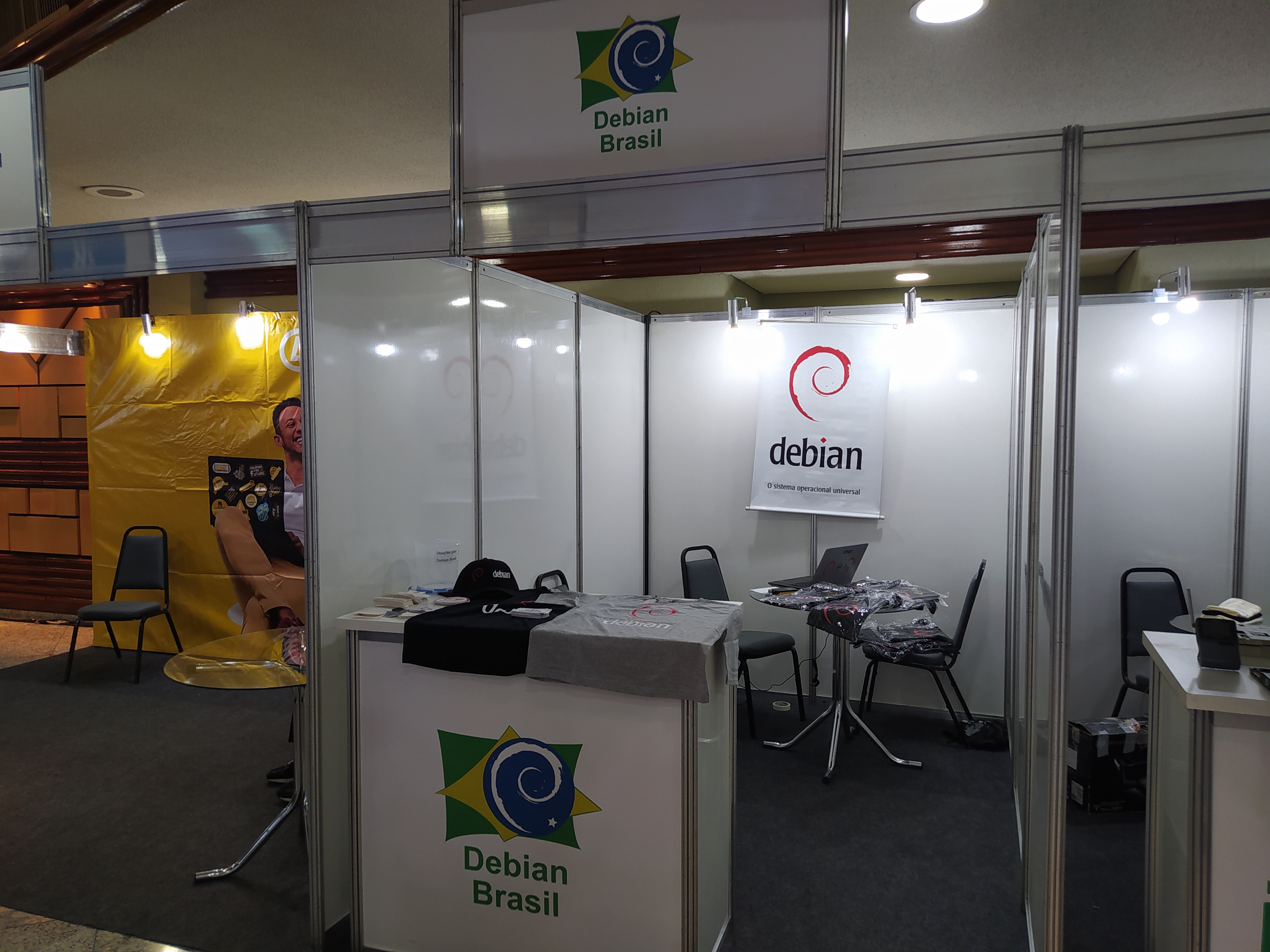 A huge number of people visited the booth, and the beginners (mainly students)
who didn't know Debian, asked what our group was about and we explained various
concepts such as what Free Software is, GNU/Linux distribution and Debian
itself. We also received people from the Brazilian Free Software community and
from other Latin American countries who were already using a GNU/Linux
distribution and, of course, many people who were already using Debian. We had
some special visitors as Jon maddog Hall, Debian Developer Emeritus Ot vio
Salvador, Debian Developer Eriberto Mota, and Debian Maintainers Guilherme de
Paula Segundo and Paulo Kretcheu.
A huge number of people visited the booth, and the beginners (mainly students)
who didn't know Debian, asked what our group was about and we explained various
concepts such as what Free Software is, GNU/Linux distribution and Debian
itself. We also received people from the Brazilian Free Software community and
from other Latin American countries who were already using a GNU/Linux
distribution and, of course, many people who were already using Debian. We had
some special visitors as Jon maddog Hall, Debian Developer Emeritus Ot vio
Salvador, Debian Developer Eriberto Mota, and Debian Maintainers Guilherme de
Paula Segundo and Paulo Kretcheu.
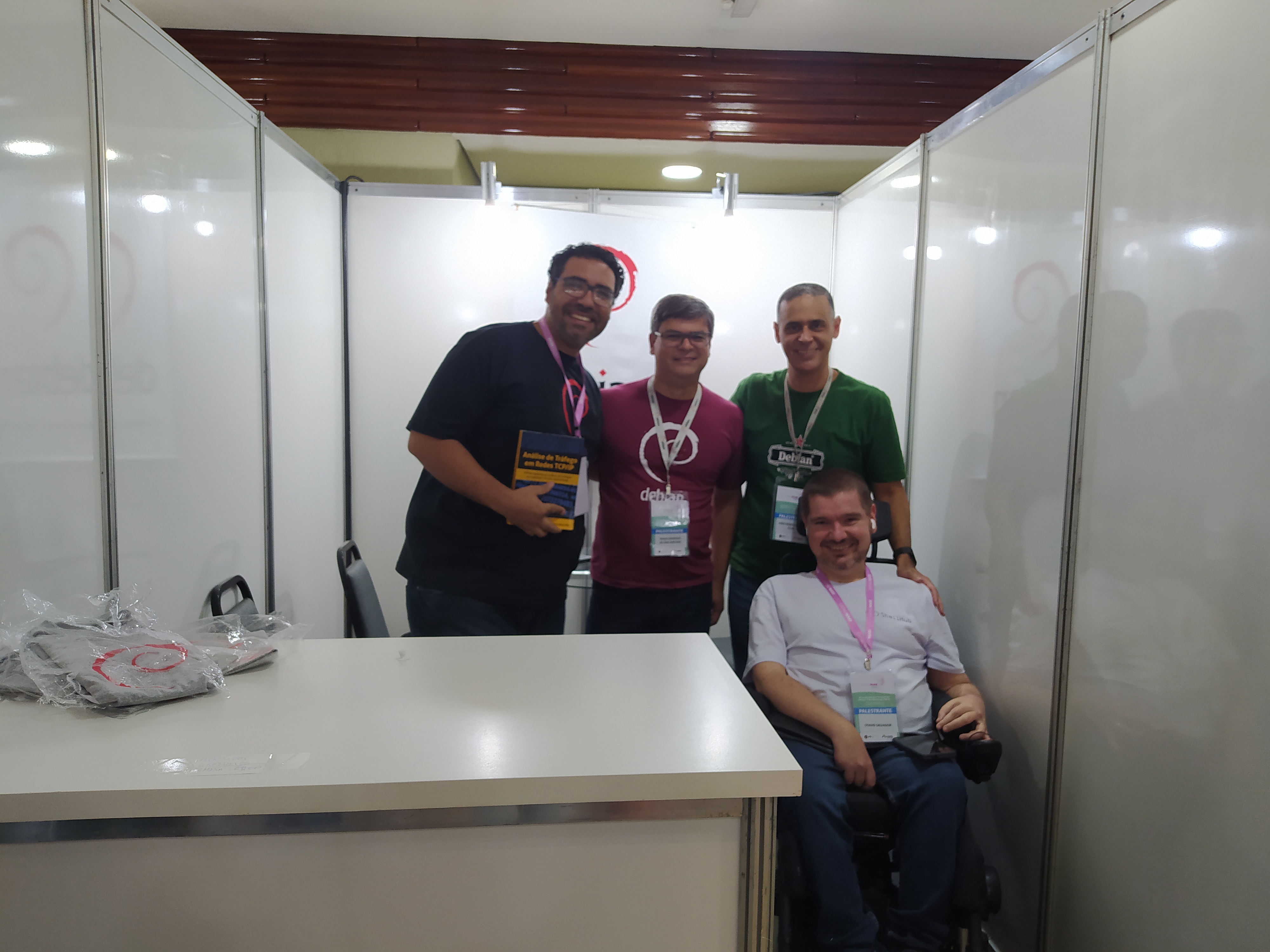 Photo from left to right: Leonardo, Paulo, Eriberto and Ot vio.
Photo from left to right: Leonardo, Paulo, Eriberto and Ot vio.
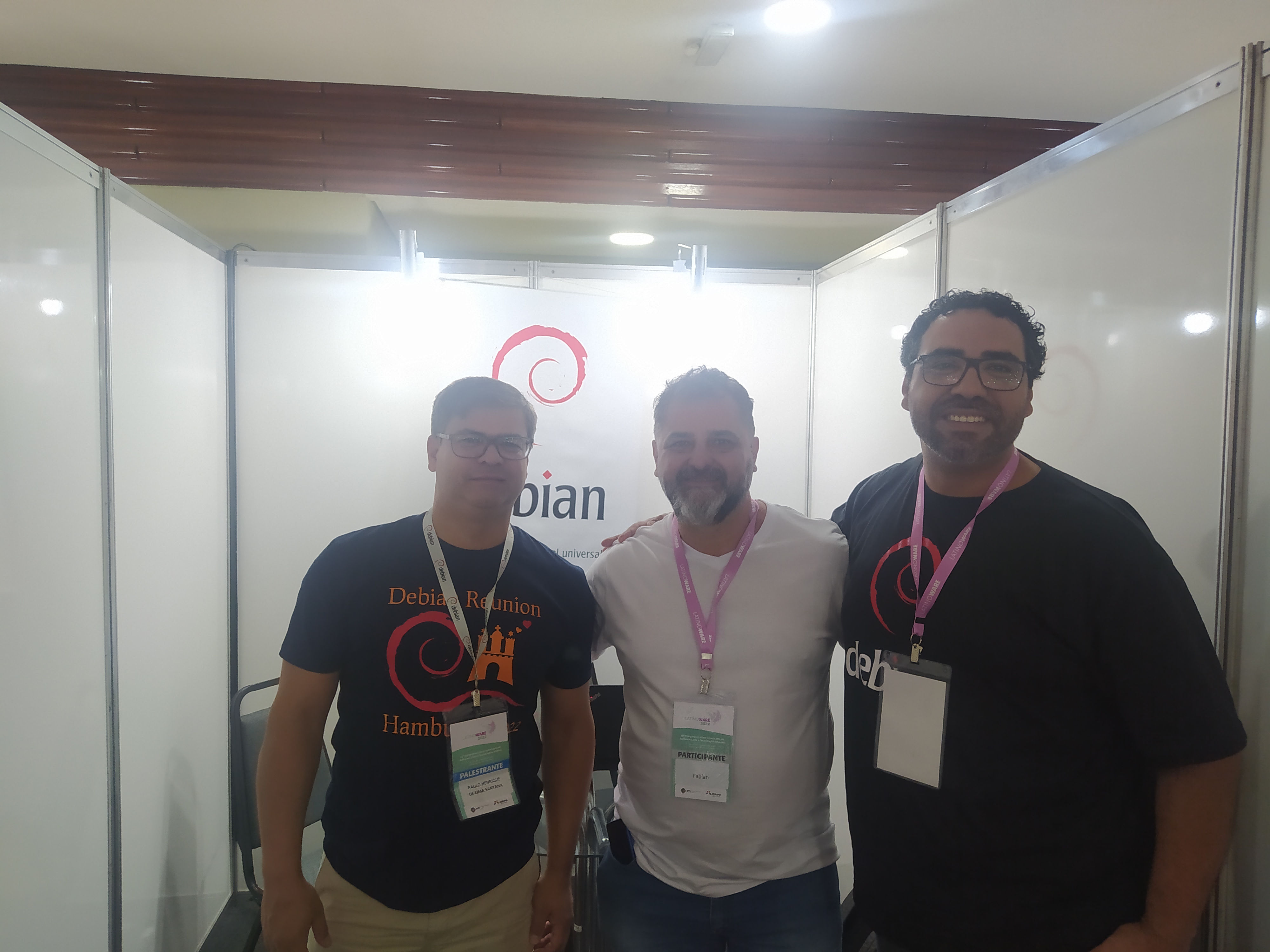 Photo from left to right: Paulo, Fabian (Argentina) and Leonardo.
In addition to talking a lot, we distributed Debian stickers that were produced
a few months ago with Debian's sponsorship to be distributed at DebConf22
(and that were left over), and we sold several Debian
Photo from left to right: Paulo, Fabian (Argentina) and Leonardo.
In addition to talking a lot, we distributed Debian stickers that were produced
a few months ago with Debian's sponsorship to be distributed at DebConf22
(and that were left over), and we sold several Debian
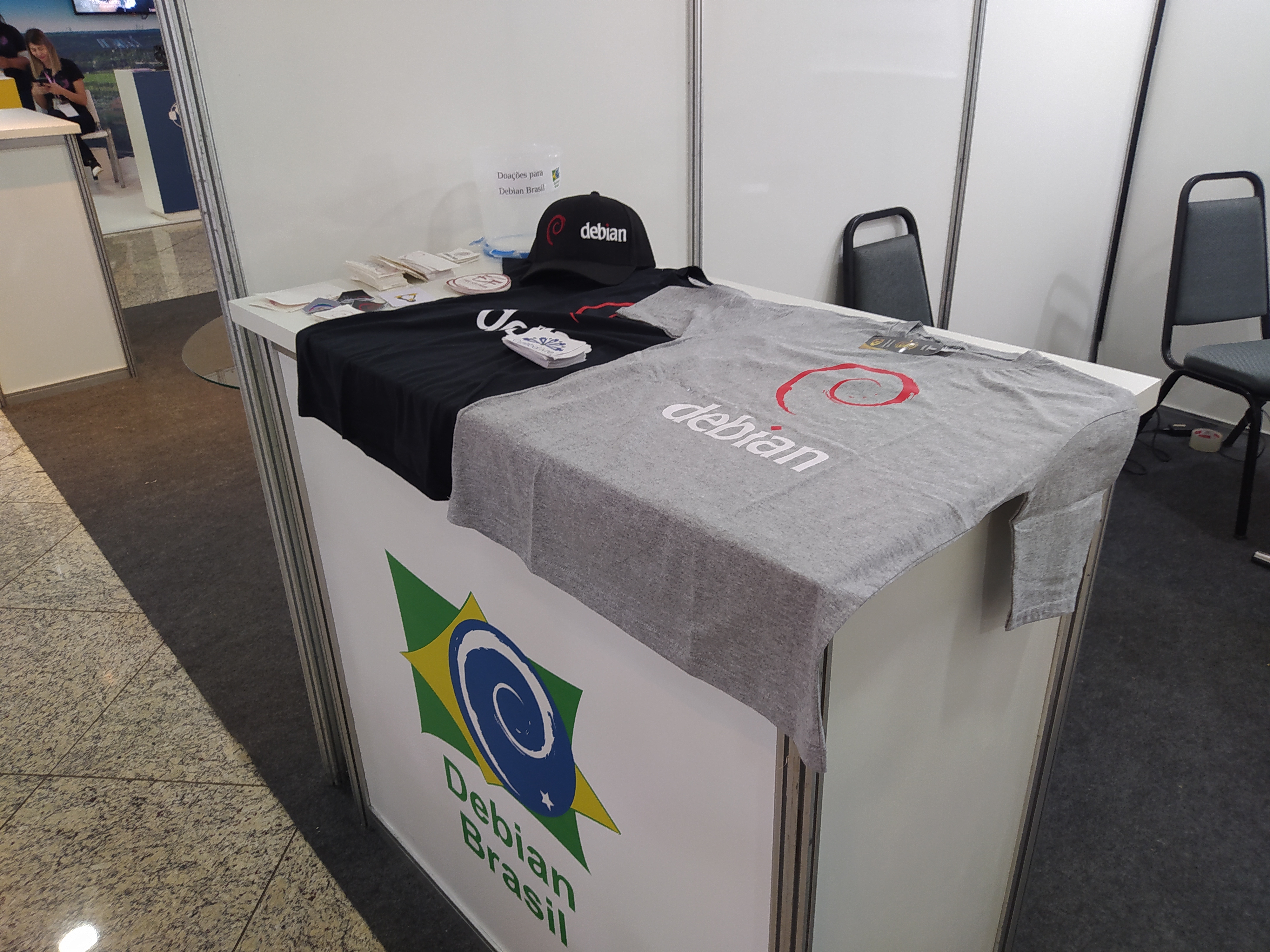
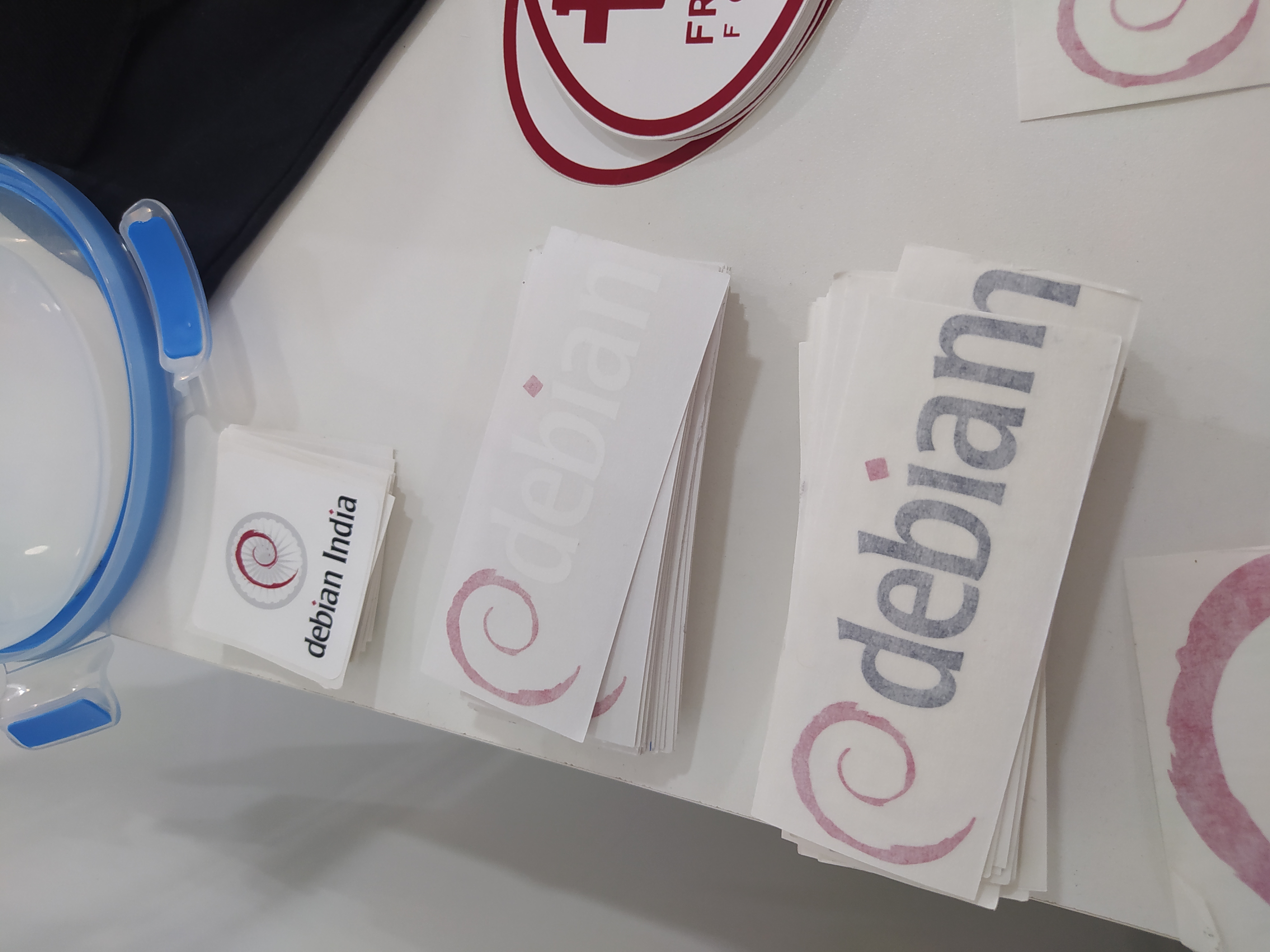 We also had 3 talks included in Latinoware official schedule.
We also had 3 talks included in Latinoware official schedule.
 Photo Paulo in his talk.
Many thanks to Latinoware organization for once again welcoming the Debian
community and kindly providing spaces for our participation, and we
congratulate all the people involved in the organization for the success of
this important event for our community. We hope to be present again in 2023.
We also thank Jonathan Carter for approving financial support from Debian for
our participation at Latinoware.
Photo Paulo in his talk.
Many thanks to Latinoware organization for once again welcoming the Debian
community and kindly providing spaces for our participation, and we
congratulate all the people involved in the organization for the success of
this important event for our community. We hope to be present again in 2023.
We also thank Jonathan Carter for approving financial support from Debian for
our participation at Latinoware.